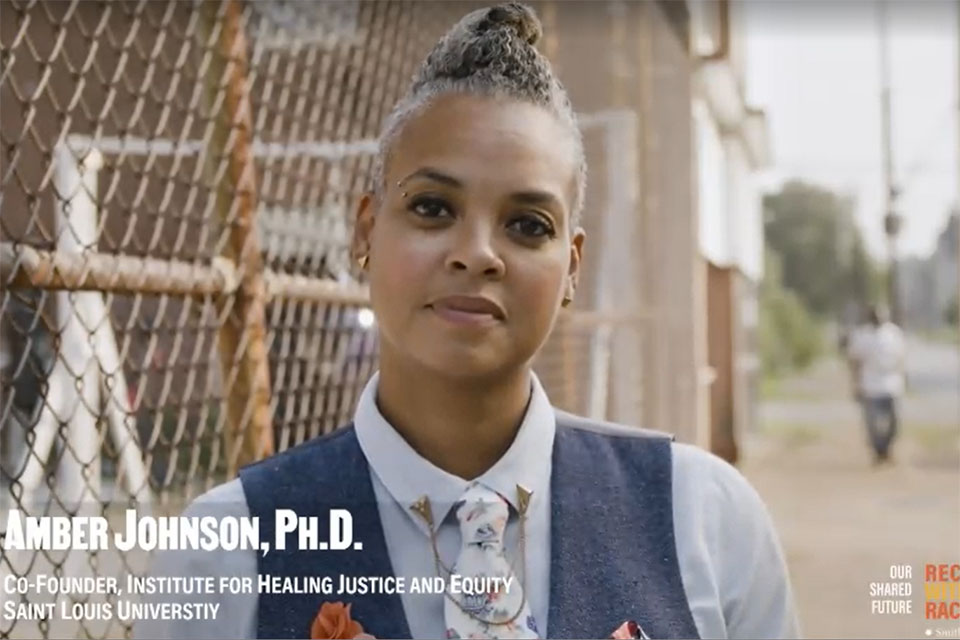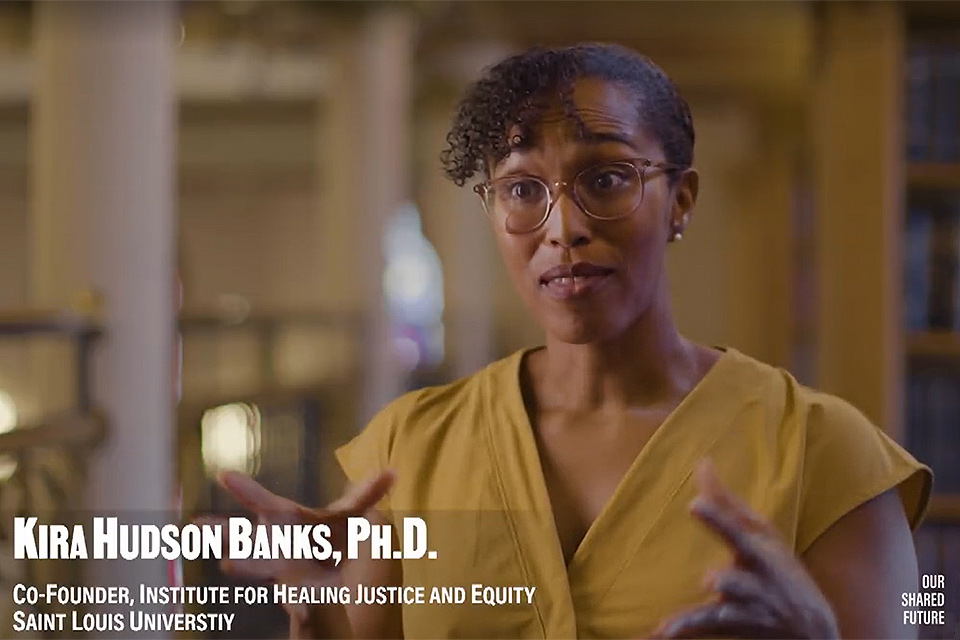Smithsonian Documentary Highlights SLU’s Institute for Healing Justice and Equity and Justice Fleet
08/27/2021
On Thursday, Aug. 26, the Smithsonian presented “Our Shared Future: Reckoning with Our Racial Past,” a 90-minute virtual forum designed to contextualize the inequities in healthcare and wealth for people of color in the United States.
The forum, which ran on the Discovery Channel’s live stream, included a mini-documentary highlighting the work of SLU’s Institute for Healing Justice and Equity (IHJE) and the Justice Fleet.
The program features SLU’s Amber Johnson, Ph.D., interim vice president for diversity and community engagement and professor of communication and Kira Banks, Ph.D., associate professor of psychology.
Through panels and short films about race, health, wealth, mental wellness and trauma, the creators examine inequities and encourage viewers to imagine a new way forward together.
The program’s final segment, a mini-documentary described as a story of possibility, features the work of Johnson and Banks with the IHJE and the Justice Fleet.
“Racism, gender injustice, environmental harmony and discord, economic injustice,
these are real problems, these are big problems,” Johnson says in the short film’s
opening moments. “There are multiple ways to heal. And art and play help us tap into
what’s necessary.”
The IHJE was established in 2018 with a mission to build equitable communities by
promoting practices that foster healing from social injustice, trauma and oppression.
SLU’s IHJE is the first program of its kind among Jesuit Universities.
Johnson and Banks are co-founders of the IHJE along with SLU's Ruqaiijah Yearby, J.D., M.P.H., professor of law and executive director of the Institute and Keon Gilbert, DrPH, associate professor of behavioral science and health education.
In the documentary, Banks and Johnson describe the way the IHJE was conceived.
“Saint Louis University had a Big Ideas competition,” Banks said. “They wanted a Big Idea to tackle a Big Problem.”
“We think about how systemic racism has extracted wellness from our lives," Johnson said. "It has caused us to not be whole because racism shows up in every single pocket of life.
“We said, well how can we leverage the University’s resources to create real change on the ground that is embedded in community,” Johnson said.
“There are so many ways in which racism can impact us. And, we’re just starting to understand the depths of it,” Banks said. “We are all harmed by systems that treat people disparately on the basis of their skin tone and of their race and of their ethnicity.”
The documentary also highlights the work of the Justice Fleet, a mobile, social justice, pop-up museum founded by Johnson in 2017 to foster communal healing through art, dialogue and play.
Johnson describes the way in which two of the Justice Fleet’s exhibits, Radical Forgiveness
and Radical Imagination, foster healing and encourage the vision of a different future.
“Radical Forgiveness is about healing from our trauma so we don’t reinforce it and
perpetuate it,” Johnson said. “Radical Imagination is all about play therapy and visualizing
the world we want to live in.
“When we are imagining the world we want to live in, it can be anything we want.”
To view the full forum and documentary, visit “Our Shared Future: Reckoning with Our Racial Past” at https://oursharedfuture.si.edu/.
Institute for Healing Justice and Equity (IHJE)
Led by a multidisciplinary group of faculty, the Institute for Healing Justice and Equity at Saint Louis University is an initiative that has the potential to transform SLU into the epicenter of equitable community building and knowledge curation related to healing from social injustice, trauma and oppression.
The Justice Fleet
The Justice Fleet is a mobile network of experiences that foster community healing through art, dialogue and play. Housed inside of box trucks, each mobile exhibit features different forms of interactive therapy and ventures into various neighborhoods to engage community members in discussions about healing justice, implicit and explicit bias, social justice and empathy.
The Justice Fleet was recently awarded $23,000 to launch a community grief garden by the St. Louis Regional Racial Healing + Justice Fund.



















